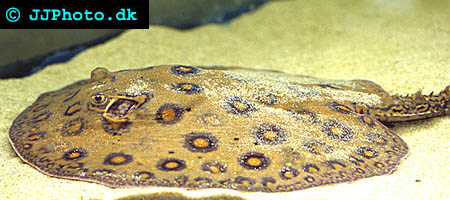Tag Archives: Brazilian stingrays
Stirring, charging, and picking: hunting tactics of Brazilian stingrays
If you want to learn more about how the charismatic creatures known as stingrays feed, you should check out a new study published in the most recent issue of Neotropical Ichthyology.
While spending days and nights scuba diving and snorkelling in the upper Paraná River of Brazil, researchers Domingos Garrone-Neto and Ivan Sazima made 132 observations of freshwater stingrays and noticed three different forms of foraging behaviour.
Picture of Motoro Sting Ray, Ocellate river stingray – Potamotrygon motoro.
Copyright www.jjphoto.dk
The first hunting technique involved hovering close to the bottom, or even settle on top of it, while undulating the disc margins. By doing so, the stingray would stir up the substrate, unveiling small invertebrates. The invertebrates – typically snails, crabs and larval insects – could not escape from under the ray’s disc and ended up as food.
When using its second hunting technique, the stingray would slowly approach shallow water while keeping its eyes on suitable prey items that concentrate in such environments. When it got close enough, it would make a rapid attack; stunning the prey or trapping it under its disc. This hunting technique did not target tiny invertebrates hiding in the sand; it focused on tetras and freshwater shrimps instead. The studied stingrays only used this method during the night when they could sneak up on prey without being seen.
The third technique observed relied on the presence of vertical or inclined surfaces in the water, such as boulders and tree stumps, including man-made structures like concrete slabs. On this type of objects a lot of different organisms, e.g. snails, like to crawl around or attach themselves. The hunter would simply position itself with the anterior part of its disc above the water’s edge and start picking the animals off the surface, one at a time.
The two studied species were Potamotrygon falkneri and Potamotrygon motoro; both belonging to a genus of freshwater stingrays found exclusively in South America.
As mentioned above, you can find the paper in Neotropical Ichthyology 7.
Garrone-Neto, D and I Sazima (2009) Stirring, charging, and picking:
hunting tactics of potamotrygonid rays in the upper Paraná River. Neotropical Ichthyology 7, pp. 113–116.
